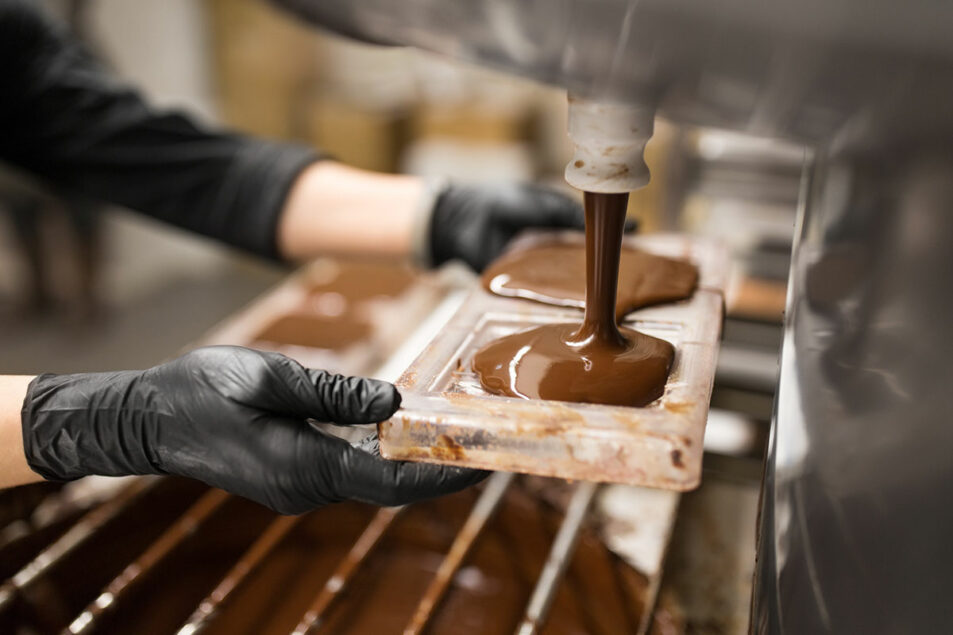
KANSAS CITY — For food and beverage startups, self-manufacturing is “the road less taken” for good reason, said Chris Young, co-founder and chief executive officer of chocolate brand Pocket Latte.
“I’ve spent countless nights putting out fires (not literally), and hundreds of thousands of dollars on unforeseen expenses,” Mr. Young wrote in a LinkedIn post. “I’ve always had a lingering doubt in my mind, wondering if we should’ve stuck with co-packers.”
Monrovia, Calif.-based Pocket Latte produces chocolate squares formulated with coffee. Mr. Young, who launched the business four years ago with his mother, decided to raise capital early to set up manufacturing operations. For many entrepreneurs, this tack means parting with too much equity too soon.
Mr. Young detailed additional challenges of self-manufacturing, citing “obstacles, unforeseen predicaments, learning curves and costs.”
“It’s expensive,” he said. “Manufacturing overhead enters the equation, machines break, scaling comes with constant upgrades, certifications aren’t cheap, and life happens.”
Self-manufacturing takes time away from focusing on sales, marketing and other important functions of running a business. Important considerations such as food safety and third-party audits are typically not concerns for brand owners outsourcing production to contract manufacturers.
Despite the drawbacks, self-manufacturing offers significant benefits. Mr. Young cited consistency in product quality, efficiency in execution and reformulation, and better unit economics.
“In this margins game, self-manufacturing enabled us the wiggle room to sustain and grow,” he said.
As many brands struggled to meet demand during the pandemic, Pocket Latte successfully navigated raw material shortages, price hikes, labor challenges and more by leveraging existing relationships and contracts with suppliers and leaning on its production team.
Brands pioneering early-to-market innovation may have no other option than to self-produce. The founders of Mid-Day Squares, a Montreal-based chocolate maker, met with more than two dozen contract manufacturers across Canada, the United States and Europe only to learn “no one was able to manufacture the product for multiple reasons,” said Lezlie Karls, co-founder and co-CEO.
“Everything about our product is just complex, from supply chain to the type of chocolate (and) how we make our chocolate,” she said. “We had a lot of issues, and we realized, ‘Oh wow, we’re going to have to manufacture this thing.’”
Mid-Day Squares eventually raised Series A funding and secured a loan from the Canadian government, using the proceeds to build a production facility.
Tonya Donati, co-founder of Mother Kombucha, said self-manufacturing was “the only solution for us when we started as there weren’t any kombucha co-manufacturers at that time.”
Today, her St. Petersburg, Fla., company uses a combination of in-house production and co-manufacturing.
“I have to say that I prefer the in-house model for our application,” she said. “We can be far more nimble. We produce when we need and can alter our production schedule to suit changes in demand. I like offering living-wage jobs and second-chance hiring to our community.
“However, for scaling and exponential growth purposes, I don’t want to be building out a new factory every few years, so a blended model works best for us in the end.”
Other founders offered additional perspective. One described relying on contract manufacturing as being “at the mercy of others,” and another said self-manufacturing was a “core strategy” to building his successful business, adding, “I think it’s the most strategic thing most CPG brands can do, but it’s not for the faint of heart.”
The self-manufacturing model offers many powerful advantages. Though expensive and intensive, especially for an early-stage entrepreneur with limited access to capital and resources, maintaining control over quality and agility in innovation are crucial to success in a competitive marketplace.
Read Again https://www.foodbusinessnews.net/articles/22295-taking-manufacturing-into-your-own-handsBagikan Berita Ini














0 Response to "Taking manufacturing into your own hands - Food Business News"
Post a Comment